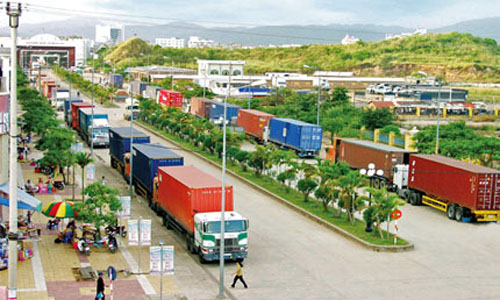 Society
Society


|
| Under Decree 86/2014/NĐ-CP, internal transport is defined when a vehicle with nine seats or more is used to periodically transport officials, public servants, officers, employees or students from their living place to the workplace or studying location or vice versa. — Photo logistics.gov.vn |
HÀ NỘI — Units, organisations or companies that use internal transport will have to obtain transport business licences if the proposed revised law on road traffic from the Ministry of Transport is passed.
Under Decree 86/2014/NĐ-CP, internal transport is defined when a vehicle with nine seats or more is used to periodically transport officials, public servants, officers, employees or students from their living place to the workplace or studying location or vice versa.
However, Decree 10/2020/NĐ-CP that replaces Decree 86 does not impose conditions for transport business without direct money collection and only deals with firms like taxi companies or bus businesses that directly collect money from customers. Internal transport is expected to be regulated by a separate decree.
Vice-chairman of the National Committee for Traffic Safety Khuất Việt Hùng said that it was time to legalise regulations relating to internal transport, as without doing so, firms could register their vehicles as used for internal transport instead of normal transport business to avoid conforming to business requirements, he told Giao thông (Transport) newspaper.
Now, out of 1.2 million vehicles providing transport services, one third of them were used for internal transport, Hùng said.
“Internal transport, which is classified as a transport business without direct money collection, needs to be subject to the law. It would help ensure road safety when firms have to meet business conditions and obtain business licences. It would also help create healthy competition for all firms that provide transport services,” he said, noting that taxis companies are currently subject to many regulations.
Phan Thị Thu Hiền, vice head of the Directorate for Roads of Việt Nam, said that under the revised law on road traffic, transport business is classified into two categories - transport business with direct money collection and transport business without direct money collection.
Internal transport would be regulated as a transport business without direct money collection and must apply for a business licence, according to the bill.
However, if the bill was approved, foreign direct investment (FDI) companies could be recognised as transport business providers, Hiền said, adding that this went against Việt Nam’s commitments when participating in the World Trade Organisation.
According to the commitments, passenger transport companies in Việt Nam have a maximum 49 per cent of their capital from foreign investment and freight companies can have a maximum 51 per cent of their capital from foreign investment.
Hiền recommended FDI companies be granted licences for transport business without direct money collection but some restrictions could be imposed on FDI companies’ vehicles.
Vice-minister of Transport Lê Đình Thọ said the revised law was expected to cover all kinds of business transport and business vehicles so the law could deal with any possible problem in the future.
“Business conditions are needed for transport firms to select qualified service providers,” he said, adding that specialised business transport forms would have other specific regulations to regulate them.
When enterprises owned vehicles to serve production and operation, to some extent, they ran business transport, so they needed a transport business licence, Thọ said.
Minister of Transport Nguyễn Văn Thể said when a vehicle violated a violation, organisations must pay a fine as much as twice the fine imposed on individuals, so it was necessary to identify which organisation the vehicle belonged to.
“Internal transport firms must have a business licence so authorities can know how many vehicles an organisation/enterprise has,” he said, suggesting the revised law have regulations in cases when the enterprises have had business licences revoked. —VNS